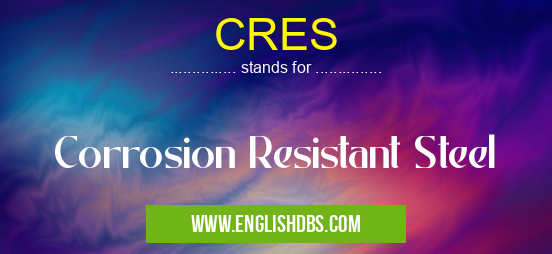What does CRES mean in AIRCRAFT & AVIATION
CRES is an acronym for Corrosion Resistant Steel. This type of steel is specifically designed to prevent corrosion from occurring on its surface. The term “corrosion resistant steel” encompasses a number of different grades and composition of metals that have been in use for centuries to protect materials susceptible to oxidation damage during varied types of exposure. In the modern world, this metal has become increasingly important as it is used in everything from infrastructure projects to medical equipment. It is also widely used in everyday items such as tools, cutlery and furniture due to its ability to withstand wear and tear without compromising safety and durability.

CRES meaning in Aircraft & Aviation in Miscellaneous
CRES mostly used in an acronym Aircraft & Aviation in Category Miscellaneous that means Corrosion Resistant Steel
Shorthand: CRES,
Full Form: Corrosion Resistant Steel
For more information of "Corrosion Resistant Steel", see the section below.
Essential Questions and Answers on Corrosion Resistant Steel in "MISCELLANEOUS»AIRCRAFT"
What is Corrosion Resistant Steel?
Corrosion Resistant Steel (CRS) is a type of steel that is designed to be more resistant to corrosion than ordinary carbon steel. The resistance to corrosion comes from a variety of properties built into the steel, including its composition as well as various treatments which are applied to the steel during production.
How does Corrosion Resistant Steel work?
CRS works by forming an oxide layer on its surface which helps to slow or prevent oxidation, the process which causes corrosion. The oxide layer also helps to keep out moisture and other elements which can cause further degradation of the material.
What types of Corrosion Resistant Steel are available?
There are several different types of CRS available, such as stainless steel, galvanized steel, and alloy steels. Each type offers different levels of protection against corrosion depending on the application.
What applications does Corrosion Resistant Steel have?
CRS has many different uses in both residential and commercial applications, such as in watercrafts, bridges, pipelines, construction projects and more. It's also often used in chemical processing plants where it can provide effective protection against harsh chemicals and high temperatures.
What are some advantages of using Corrosion Resistant Steel?
One major advantage is that it offers increased durability compared to regular carbon steel due to its enhanced resistance against rusting and corrosion. CRS also offers greater design flexibility since it can be tailored for specific structural requirements with additional treatments during manufacture. In addition, it requires less maintenance than carbon steel due to its protective oxide layer which helps prolong service life.
Where can I buy Corrosion Resistant Steel products?
You can find a wide range of products made from CRS at most hardware stores or online retailers like Amazon or eBay. Additionally there are specialized suppliers that offer custom fabrication services if you require specific components for your project.
How do I care for my Corrosion Resistant Steel items?
To ensure maximum effectiveness and longevity of your CRS items it’s important that they are properly stored in dry locations when not in use. Most products also require occasional cleaning with mild soap and water before being dried thoroughly with a soft cloth or brush. Some items may require specialized cleaning solutions which should be discussed with a professional prior to use.
Are there any drawbacks to using Corrosion Resistant Steel?
While CRS has many advantages over regular carbon steel there are some potential drawbacks such as its higher cost compared to standard steels and some types may not offer adequate protection when exposed long term exposure extreme environments like saltwater or high-temperature conditions exceeding 500 degrees Fahrenheit.
Final Words:
CRES is an extremely useful material when it comes to protecting materials from corrosion in various settings. Its corrosion resistance properties are unmatched by other common materials making it invaluable for a variety of applications where extra protection against wear-and-tear damage needs to be ensured. With its added strength, flexibility and durability it provides a strong solution which makes it an attractive option both functionally as well as economically.
